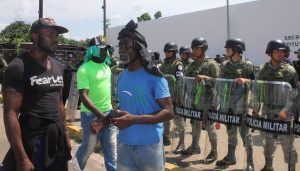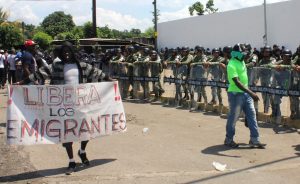Mexico City, Aug 26 (efe-epa).- Protests and demonstrations by African migrants outside the Siglo XXI immigration post in the city of Tapachula, in the southern Mexican state of Chiapas, have placed the government of Mexico “in check.”
Via peaceful protests, the migrants for the past week have been denouncing to Mexican authorities alleged acts of corruption by agents and officers with the National Migration Institute (INM), whom they accuse of delaying official authorization that would allow them to travel across the country.
 “The African migrants have other systems of organization to protest and the way in which they do so, with music and dances, is upsetting the authorities, Irineo Mujica, a human rights defender for migrants and a member of the Pueblo Sin Fronteras (People Without Borders) organization, told EFE on Monday.
“The African migrants have other systems of organization to protest and the way in which they do so, with music and dances, is upsetting the authorities, Irineo Mujica, a human rights defender for migrants and a member of the Pueblo Sin Fronteras (People Without Borders) organization, told EFE on Monday.
The activist, who has documented and disseminated information about the protests, also believes that the authorities “do not understand” the migrants and that there exists a type of racism among Mexican officials due to the color of the Africans’ skin.
“One problem is that of language – some speak English or French and others their own languages, there are seven or eight languages. It’s a community that’s very difficult to understand,” he said.
Mujica said that pressure from Washington not to allow the migrants to get to the US border is the main obstacle facing the Africans with Mexican authorities.
“The main problem is that the African migrants don’t have a way out, a solution, and besides (the authorities) don’t want them to go to the northern border,” he said.
Mujica and his colleague Cristobal Sanchez have been fingered as being behind the African migrants’ protests, something that Pueblo Sin Fronteras rejects.
On Monday, Mexican President Andres Manuel Lopez Obrador said that his government is “complying with its promise to make migration orderly” in Mexico after signing an agreement with the US on June 7 to avoid the imposition of sanctions by the Donald Trump administration.
He noted that in early September there will be a meeting between the Mexican and US governments, given that the evaluation “period” for whether Mexico is doing enough to control US-bound migration ends on Sept. 10.
As part of the June agreement with the US, Mexico sent the National Guard – a newly created security force – to its northern and southern borders and hired more immigration personnel.
On Aug. 8, the US government reported that detentions of undocumented migrants on the border with Mexico had fallen by about 45 percent after the pact.
